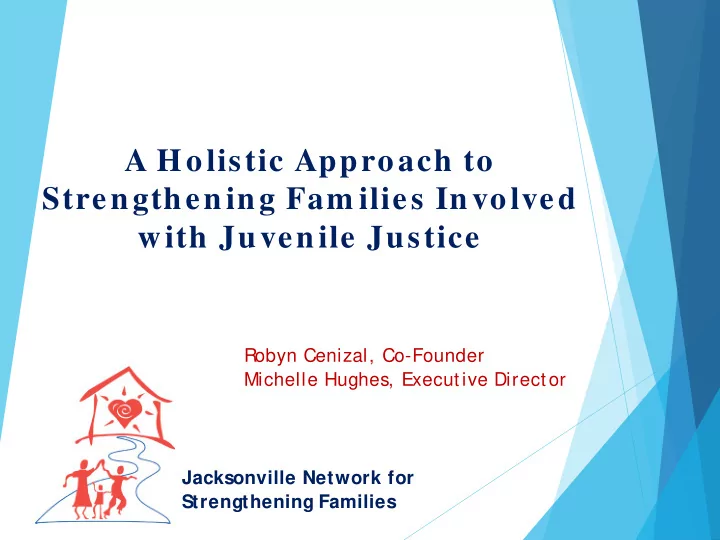

A Holistic Approach to Strengthening Fam ilies Involved with Juvenile Justice Robyn Cenizal, Co-Founder Michelle Hughes, Executive Director Jacksonville Network for Strengthening Families
Fam ily is Fundam ental The Annie Casey Foundation asserts that the family strengthening approach is a framework for serving children and families that is rooted in the following principles: family is the most fundamental factor influencing the lives and outcomes of children; and families are strong when they are supported by safe and thriving neighborhoods.
The Natural Process “ The natural process of growing up and becoming socialized is typically so full of disappointments and confusion that it's essential to have parents who can reliably offer us solace and calm us down when we've depleted our limited coping resources.” Bonding vs. Bondage: What We Learn from Our Parent s -Leon F . S elt zer, Ph.D.
Childhood Matters Stress Responses: Positive, tolerable, and toxic stress responses. Adverse Childhood Experiences: Direct abuse and exposure to household dysfunction. Resiliency: cumulative impact of positive experiences and coping skills. Executive function and self-regulation skills: mental processes that enable us to plan, focus attention, remember instructions, and j uggle tasks. S ource: ht t p:/ / developingchild.harvard.edu/ science/ key-concept s/
Building the Network The Jacksonville Network for S trengthening Families Convening - Brother Pete Jackson convened faith- based and community leaders to discuss distressed state of community Needs Assessment – BYU conducted a needs assessment of high-risk, low-resource families Curriculum – Customized version of 7 Habit s of S uccessf ul Families in Jacksonville Partnerships – Network of over 50 partners with MOUs to support cross-referrals Case Management – Individualized self-directed plans include referrals and follow-up
Basic Change Model Paradigms SEE Views Values Principles Results GET DO Behaviors/Habits Franklin Covey 2004
Fam ilies Under Stress Participants included age 13 and older with 57% of participants being male. The study revealed there is a direct and inverse relationship between the stresses experienced by families and their family functioning scores, with higher stress levels being associated with lower scores. 52% of participants reported that they were experiencing stress as a result of one or more recent events within their family. 10% reported feeling highly stressed. Alcohol or substance abuse was the number one reported stressor (18% ), followed closely by uncontrollable anger, physical or emotional abuse (17% ), with eight other categories cited with less frequency.
Increased Fam ily Functioning 60% of participants improved their family functioning scores from pre-test to post-test; increasing to 64% six months following the workshop. 86% indicate learning the 7 Habits has made a positive difference in their life; this increases to 96% one year later. This trend of increased family functioning and self- efficacy indicates that the more families apply the knowledge and skills gained in the program; the better they become at coping with these stressors and proactively addressing issues that are preventing their families from being successful. (Note: Based on feedback from this evaluation, the Network now uses Retrospective Pre-Test. Using this tool, results reflect 84% increase in family functioning scores.
Juvenile Justice Efforts S tate of Florida Department of Juvenile Justice Partnership. OPP AGA ’s review indicates: Program participants who had been placed in detention had lower rates (24% n=209) of recidivism within six months of release than did j uveniles (32% n=3,286) where parents did not participate in the program. Fresh Path served 244 court-involved youth offering 7 Habits of S uccessful Families coupled with self-selected case management services>
Breaking the Cycle of Incarceration Boys who grew up without their biological father in the home were three times more likely to commit a crime that led to incarceration . 70% of incarcerated adults come from Children of single-parent divorced parents homes. are up to six times more likely to be delinquent than children from intact families. 10
The Strengths-based Approach Uses comprehensive assessment and self-directed educational experience to support family in determining individual, social, or contextual strengths. S hifts the focus of case management to a more holistic view of the family, their situation and priorities. Designs a pathway for families that help them lay out meaning and set goals that are aligned with both personal and environmental strengths to achieve them. Leverages community partnerships to allow families to connect with services to support their plan.
Engaging Fam ilies Adult learners are considered distinct from child learners due primarily to the work of Malcolm Knowles, who developed the principle of Andragogy. Families Must Feel Respected Adults are Relevancy-oriented Learning must be applicable to have value They are Goal-oriented They appreciate organization and clear obj ectives Families have a foundation of life experiences Drawing on those experiences enhances learning 12
Engaging Network Partners Net work List serv of over 300 individuals and agencies Mont hly Part ner Meet ings Increase awareness of community resources Promote collaboration
Self-Selected Services
Cross-Referrals Provide Com prehensive Support • Education/ Job • S tate Attorney Training Diversion • Housing • Child Welfare • S ubsidized Child Care • S ubstance Abuse Services • Mental Health Treatment S ervices • Homeless S helter Referrals Jacksonville Network for • Case Management Strengthening Families • S kill based Training • Communication • Conflict Management • Time Management
Why We Must Support the Fam ily video
Questions
Recommend
More recommend